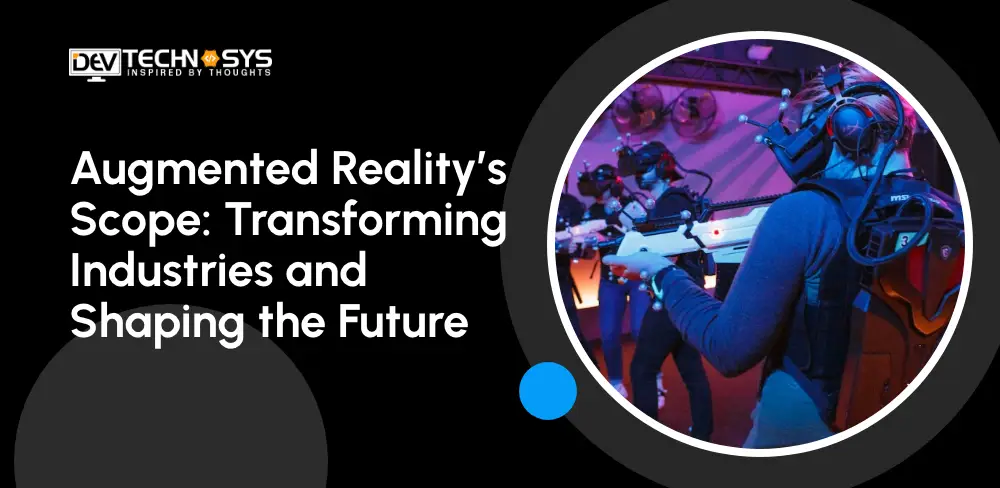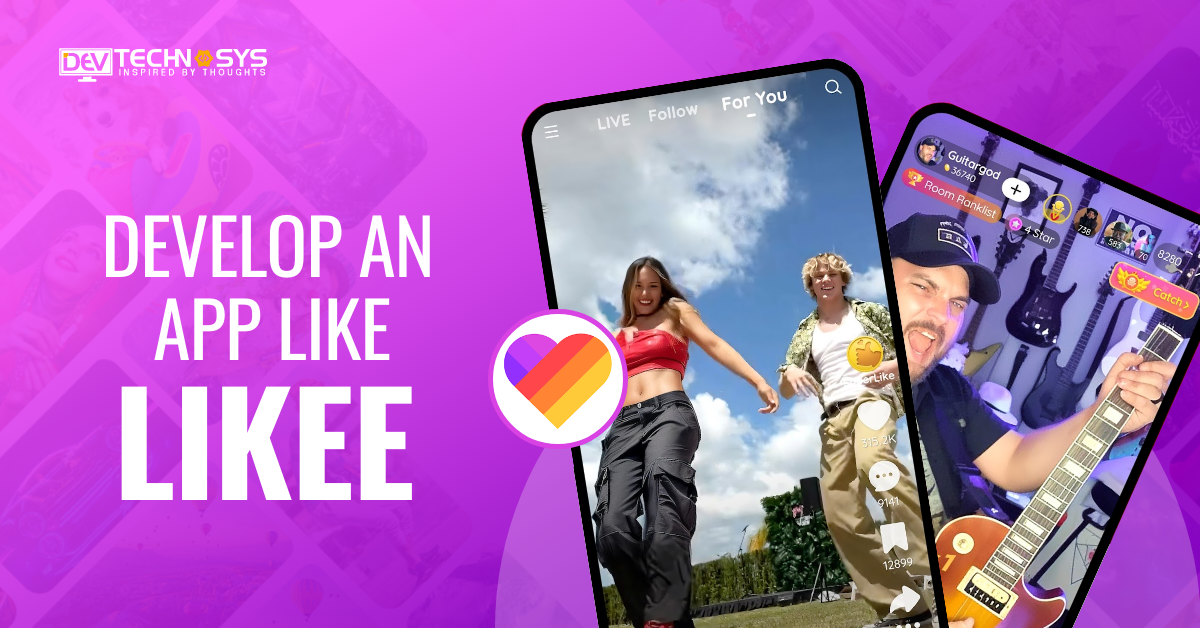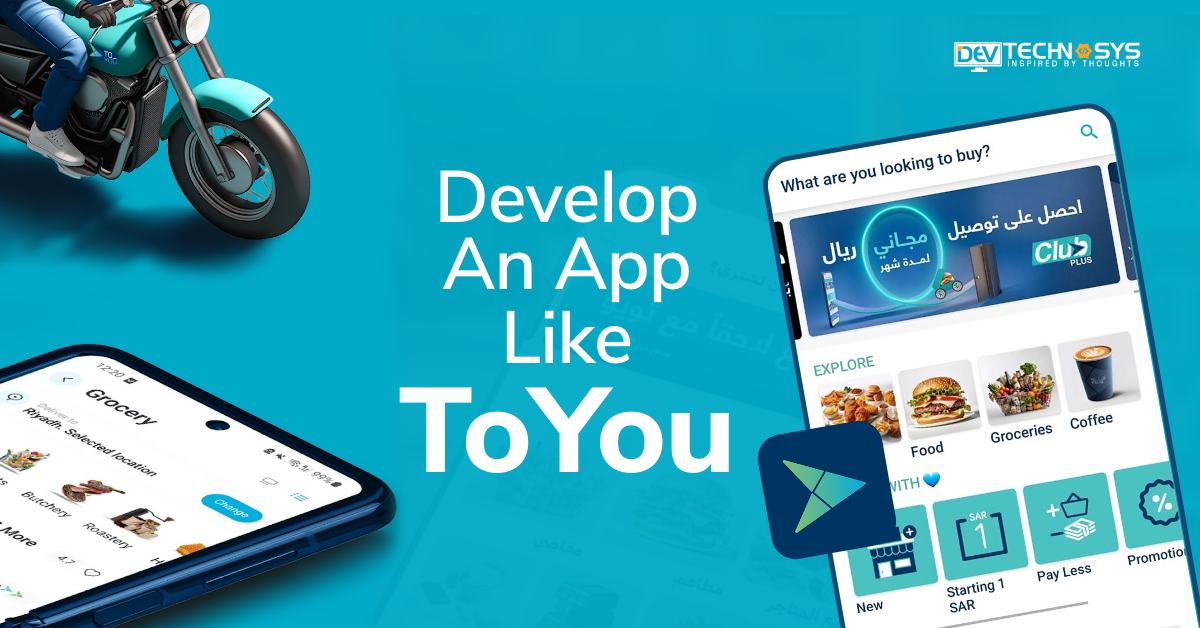“Augmented reality will change the way we see the world, bridging the gap between the digital and physical realms.”
Tim Cook
In today’s business world, virtual and augmented reality are essential components. AR and VR have improved many business projects. In the coming years, the augmented reality scope will be huge.
AR is one of the innovative technologies that has transformed science fiction into a reality. Holograms like those in Star Wars or Marvel movies are now all around us. It’s a new immersive technology that is more than entertainment. Augmented reality is a powerful business tool today.
In a variety of industries, including retail, gaming, healthcare, and the military, augmented realities are used to solve business challenges. Keep an eye on the future scope of augmented reality of these technologies.
According to Statista, the global market for augmented and virtual reality was worth USD 41.56 Billion in 2022 and will grow to USD 859.35 Billion by 2030. This represents a CAGR between 2022 and 2030 of 46.03 %.
The two technologies will have a significant impact on your business environment by 2023. You’ll have to integrate both technologies as software and hardware becomes more affordable.
You’ll need your vision and imagination in order to comprehend this augmented reality software development. The blog will cover the impacts and augmented reality scope on various industries, application cases for AR in the present day, and how these technologies might transform your company.
Let’s get started!
What is Augmented Reality?
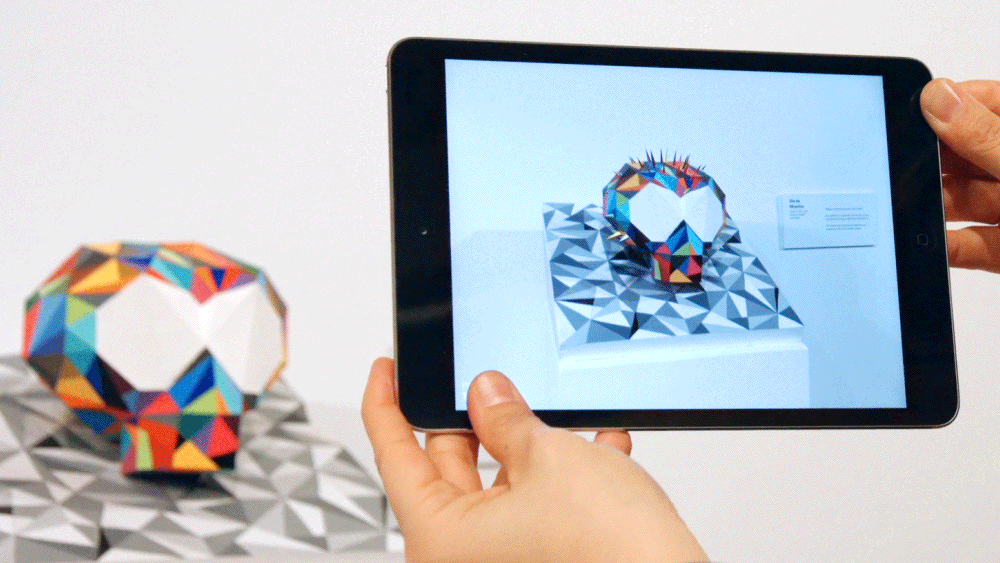
Augmented reality (AR) is the use of technology to add artificial, digital qualities to real-life objects. AR is, in other words, when you add new sounds, sights, or sensations to what you are seeing using software or a gadget. AR is often thought to be limited to smartphone apps that add visual elements. The augmented reality scope has many more uses than just this.
AR is often used when buying glasses online. You can’t physically put on the glasses when you “try them on”, as you cannot reach into the screen to touch them. Also, you take a picture of the frame and superimpose it over your face in order to get an accurate estimate of how you will look wearing the glasses. You are augmenting your reality – once you start wearing the glasses and order them, this augmented identity becomes your true one.
Current Market Size of Augmented Reality

- The mobile augmented reality market (AR) was valued at 12.45 billion U.S. Dollars in 2021. The market is expected to reach 17 billion U.S. Dollars in 2022 before exploding to 36 billion U.S. Dollars by 2026. This market also includes digital products, like in-app purchases for AR applications as well as advertising placements and visualization tools.
- By 2023, the global AR headset shipment is expected to reach 30 million units. This is more than 12 times what was anticipated in 2020.
- Apple Vision Pro, a mixed reality device, allows users to switch from AR to immersive virtual realities by turning a dial.
- The AR & VR industry is expected to generate revenues of US$31.12bn by 2023.
- With a projected revenue growth rate of 13.72% (CAGR, 2023-2027), the market is expected to generate US$52.05 billion.
- AR software is the largest market with a volume of US$11.58bn by 2023.
- With a market volume estimated to reach $8,568.00m in 2023, the United States produces the greatest income.
- By 2027, AR & VR users are expected to reach 2,593,00m.
Impact Of AR On Various Industries (& Real Use Cases)
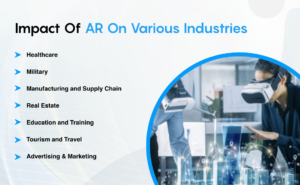
Gaming, retail, travel and tourism, and food are the most prominent industries where AR is being used. AR’s use cases are not limited to these verticals. In many other industries, Augmented Reality has been a great tool to help entrepreneurs solve core problems and increase profits. Here are some of the companies that use augmented reality.
1. Healthcare
AR’s role in the custom healthcare app and software development is impressive. This technology offers a whole new set of benefits and opportunities for healthcare professionals, medical students, and other people to have a better experience. The augmented reality scope in the healthcare sector is changing in many ways.
● A New Approach to Diagnosis
Patients often fail to mention minor symptoms to their doctors. Healthcare professionals cannot diagnose the patient and offer them the best services. With the aid of AR technology, both can more effectively diagnose and understand symptoms, leading to better results. AccuVein, for example, allows nurses and healthcare professionals to determine the exact location of veins using a handheld scanner projected onto the skin of the patient. It reduces procedure time and makes the process more painful. This increases patient satisfaction.
● Augmented Surgery
It was difficult for surgeons to perform complex surgery with the limited information they had a few days prior. It has now become far too simple with the introduction of Augmented reality to the surgical process. Now, surgeons have access to life-saving information about patients in real-time.
They can study the information accurately and overlay the anatomy of the patient over the body for accurate surgery. This allows them to visualize each body part, ensuring that other organs are not adversely affected during surgery. Additionally, it guarantees a quicker recovery time and a greater surgical success rate.
Various hospitals, including Imperial College in London and St. Mary’s Hospitals in London, are currently using this technology to perform reconstructive surgeries on patients with severe injuries.
● Enhance Training and Practice
A second business application of augmented reality in healthcare is to make training sessions more structured. It allows medical students to experience real-life situations in healthcare and then act on them, instead of relying on random training. It is a great way to see how the students handle stress, and other emotions when treating patients.
2. Military
The military sector is another business that can benefit from augmented reality. This is one of the industries that AR technology has disrupted most. Looking ahead at the augmented reality scope, it will help soldiers to prepare for battle, eliminate bombs and other explosives, improve their skills in using different weapons, etc. They can do this without risking their lives. The technology adds labels to a real-world scene and improves navigation for users – even at night.
3. Entertainment
Augmented Reality is a great improvement for the entertainment industry. In many ways, technology has affected all subdomains in the entertainment industry, whether it is music, live events, or movies. You can see the augmented reality scope in these ways:
● AR in the Music Industry
AR-powered earbuds, headphones, and other equipment enhance the listening experience by adding an enhanced layer to the audio. You can personalize the sound on the basis of background noise, filters, and other factors.
● AR in Movies
When discussing the benefits of augmented reality for business in the field of TV shows and movies, the technology is assisting the directors in including improbable/non-existent elements into the movies such as dinosaurs, allowing dancers with physical disabilities to perform with ease, as well as showing various effects on the screen. Additionally, it enables viewers to see subtitles for the TV show they are viewing in real-time. Avatar, Minority Report, and Iron Man are just a few of the films that have included augmented reality.
● AR in Media
Augmented Reality also plays a crucial role in the media field. Media experts can use the technology to improve multimedia, videos, games, and presentations. From augmented reality, app developers to conglomerates like Google and Apple – the use of AR technology for entertainment purposes is on the rise.

4. Manufacturing and Supply Chain
The unprecedented growth of the Manufacturing Industry is due to AR and mobile app development solutions. As an example:
● Maintenance of All Manufacturing Processes Takes Less Time
People are often occupied in the manufacturing and supply chain management fields with the task of finding the correct location for the item/equipment they need. The time needed to complete any task increases as a result. In this case, AR helps the user to locate the object using virtual labels, to view the 3D images of each element, and to access navigational information. It is a process that simplifies and saves time and you can see the augmented reality scope in the manufacturing industry.
● Higher Customer Experience
Mobile applications powered by Ar allow customers to track their parcels in real-time, from the warehouse all the way to their door. Apps can also share product information, such as size, weight, and price. The customers will have a better experience, which leads to a higher positive response. Android and iOS app developers are a great way to get ahead of your competition in the retail industry and provide the best experience for your customers.
5. Real Estate
Technology is undoubtedly a key factor in achieving greater success when it comes to Augmented Reality. It has enabled Entrepreneurs to expand their real estate businesses beyond the limitations of existing tools. Some of these limitations include:
● Unappealing Text Description of Apartments
Many real estate agents fail to connect even though they develop AR apps with really impressive descriptions for the apartments. It is too boring for them to read the entire description and try to imagine the actual property. In this case, AR engages the audience in a way that is more interactive and leads to higher conversion.
● Longer Time to Make a Decision
Users are often concern about whether the property they want to buy is compatible with the amenities they desire in their homes. The main reason for this is that photos only show a 2D picture of the property.
Users of augmented reality can interact with a 3D representation of the property. Additionally, they may arrange the items to see how they might appear in their own residence.
The whole process helps the customer make a quick decision without having to compromise on any aspect. IKEA Place and Curate are two of the best examples of Augmented Reality.
6. Education and Training
With the introduction of augmented reality, the education and training sector has also undergone a radical revolution. Technology has enabled students and teachers to cope with a number of current issues such as:
● Difficulty in Understanding the Concept
Students and teachers often fail to paint a larger picture of concepts. They frequently struggle to fully grasp the idea and appreciate its application in the actual world.
AR technology allows them to see a 3D object model and the concept working in front of their eyes. The 360-degree views allow them to get a better understanding of the concept, increasing curiosity and bringing forth new questions.
● Short-Memory Retention Power
Many students struggle to understand concepts when the majority of the material is in text form. AR in this context makes information visual so that students can virtually touch everything. It is easier to remember the information.
● No Practical Knowledge
Another benefit of AR in education is that it gives graduates and students an opportunity to test their theoretical understanding and better be ready for the workforce.
● Problems with Student Performance Evaluation
AR simplifies the job of teachers by allowing them to provide information to students in an interactive manner. Teachers are empower to introduce students to virtual environments and see how they react. This way, you can give them grades on the basis of the student’s performance and not just the information that they have been crammed with.
7. Tourism and Travel
Tourism includes a variety of modes of transport, hotel reservations, and hospitality, tours, sightseeing, and local experiences, such as festivals or cuisine, souvenirs, and more. As a business, you can see augmented reality scope, and the market is full of augmented reality opportunities.
Google Maps now features augmented reality. Navigation is the obvious use, with directions appearing on the screen as users scan streets using the camera of their smartphone.
AR-enabled GPS applications may provide tourist routes, translate road signs, or give sightseeing advice.
8. Advertising & Marketing
You can use AR to improve customer interaction and increase the likelihood of purchase. If the content of a mobile app is entertaining, customers are more likely to use it. Unique and creative AR experiences will surprise customers and competitors.
Onix-Systems has used augmented reality to improve its promotional material. Onix augmented reality apps reveal vivid details in our printed books, allowing us to tell the story of Onix-Systems using a similar format. The user points their mobile device to a particular page and it becomes live and you can see the popularity of augmented reality scope.
VR, like PCs and phones, will become the new central computing platform. It’s a battleground between brands and marketers.
What is the Future of Augmented Reality?
As technology continues to improve, the augmented reality market continues growing. AR is the next step in many businesses’ strategies, as the emphasis on metaverse technology has grown. Some businesses may be interested in investing early.
Retail and mobile applications may be more successful for those who are looking to adapt to rapid growth and changes. There are many AR-capable tablets and smartphones that are available. They are a great way to promote and drive conversions to users.
It’s evident that the augmented reality scope in many industries is huge, with the market set to reach $97.76 Billion in 2028. Businesses that are able to adapt in new, innovative ways to the challenges of today will determine this augmented reality future scope. Businesses that provide rich AR experiences for their customers are better positioned to compete with their competitors.
Conclusion
In the next few years, the augmented reality scope will be easily visible and will be a major business force. If you want your business to last, you need to align it with technology. The use of AR/VR is expected to increase as more media, retail, real estate, and automotive companies engage their core customers with the technology.
You should therefore contact a leading hybrid app development company to integrate these technologies into your business processes. Service providers will also likely see great potential in developing AR/VR for their clients. Moreover, AR and VR will expand to major regions, sectors, and industries for the better.
FAQ
How Much Does it Cost to Build Augmented Reality Apps?
The cost to build augmented reality apps can vary widely depending on factors such as complexity, features, platform compatibility, and development time.
On average, the cost to develop an AR app will be around $25000-$50000. However, it would be better to consult with an on-demand app development company.
How Does Augmented Reality Work?
Augmented reality works by overlaying digital information, such as 3D objects, images, or text, onto the real world. This is typically achieved using a combination of cameras, sensors, and software algorithms.
The device captures the user’s surroundings and processes the data to identify surfaces or objects. The digital content is then rendered and superimposed onto the real world through the device’s display, creating an augmented view.
How to Build Augmented Reality software?
Building augmented reality software involves several key steps. First, define the project scope and goals. Next, select a suitable development platform and tools. Design the user interface and user experience.
Hire a custom android app development services provider who can develop the software using programming languages like Unity or ARKit. Integrate computer vision algorithms for object recognition and tracking.
Test the software thoroughly and iterate based on user feedback. Finally, deploy the augmented reality software on compatible devices and continually update and maintain it to ensure optimal performance.
What Are the Challenges of Implementing Augmented Reality?
Implementing augmented reality can present some challenges, including:
- Technical complexities: Developing AR applications requires expertise in computer vision, 3D rendering, and user interaction design.
- Hardware limitations: AR experiences are often dependent on the capabilities of the user’s device, such as smartphones or smart glasses, which may have limitations in processing power, battery life, or display quality.
- User acceptance and adoption: Convincing users to adopt and embrace AR technology can be a challenge, especially if there is a learning curve or concerns about privacy and data security.









